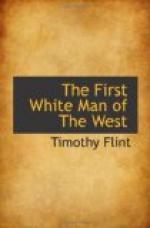No incidents of great importance occurred in this quarter, until August 3d, of the next year when a definitive treaty was concluded by General Wayne, with the hostile Indians north-west of the Ohio. By this treaty, the destructive war which had so long desolated that frontier, was ended in a manner acceptable to the United States. An accommodation was also brought about with the southern Indians, notwithstanding the intrigues of their Spanish neighbors. The regions of the Mississippi valley were opened on all sides to immigration, and rescued from the dread of Indian hostilities.
CHAPTER XIV.
Rejoicings on account of the peace—Boone indulges his propensity for hunting—Kentucky increases in population—Some account of their conflicting land titles—Progress of civil improvement destroying the range of the hunter—Litigation of land titles—Boone loses his lands—Removes from Kentucky to the Kanawha—Leaves the Kanawha and goes to Missouri, where he is appointed Commandant.
The peace which followed the defeat of the northern tribes of Indians by General Wayne, was most grateful to the harassed settlers of the west. The news of it was received every where with the most lively joy. Every one had cause of gratulation. The hardy warriors, whose exploits we have recounted, felt that they were relieved from the immense responsibilities which rested upon them as the guardians and protectors of the infant settlements. The new settlers could now clear their wild lands, and cultivate their rich fields in peace—without fearing the ambush and the rifles of a secret foe; and the tenants of the scattered cabins could now sleep in safety, and without the dread of being wakened by the midnight war-whoop of the savage. Those who had been pent up in forts and stations joyfully sallied forth, and settled wherever the soil and local advantages appeared the most inviting.
Colonel Boone, in particular, felt that a firm and resolute perseverance had finally triumphed over every obstacle. That the rich and boundless valleys of the great west—the garden of the earth—and the paradise of hunters, had been won from the dominion of the savage tribes, and opened as an asylum for the oppressed, the enterprising, and the free of every land. He had travelled in every direction through this great valley. He had descended from the Alleghanies into the fertile regions of Tennessee, and traced the courses of the Cumberland and Tennessee rivers. He had wandered with delight through the blooming forests of Kentucky. He had been carried prisoner by the Indians through the wilderness which is now the state of Ohio to the great lakes of the north; he had traced the head waters of the Kentucky, the Wabash, the Miamies, the Scioto, and other great rivers of the west, and had followed their meanderings to their entrance into the Ohio; he had stood upon the shores of this beautiful river, and gazed with admiration, as he pursued its winding and placid course through endless forests to mingle with the Mississippi; he had caught some glimmerings of the future, and saw with the prophetic eye of a patriot, that this great valley must soon become the abode of millions of freemen; and his heart swelled with joy, and warmed with a transport which was natural to a mind so unsophisticated and disinterested as his.




